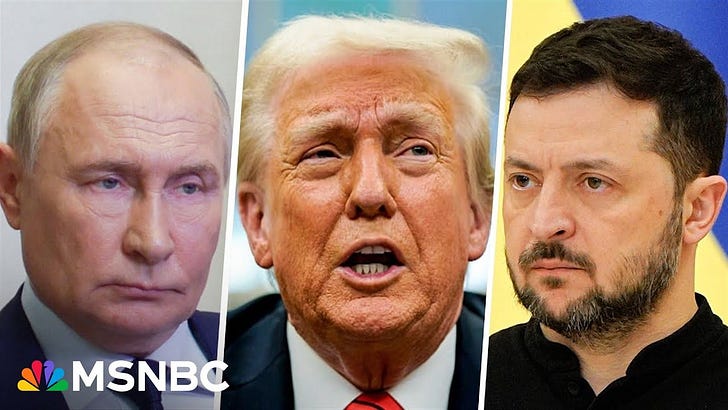Why Trump Failed in Ukraine
Trump's fundamental misunderstanding of the war in Ukraine made his efforts to end it unworkable. Appeasing the aggressor and punishing the victim was never going to work.
In the past week it’s become increasingly clear that the Trump administration is preparing to walk away from its efforts to end the war in Ukraine by blaming the war’s victim (Ukraine) for the failure of negotiations and instead move to improve relations with the aggressor (Russia).
“I think we have a deal with Russia,” Trump told reporters at the White House on Wednesday. “I thought it might be easier to deal with Zelensky,” he said. “So far it’s harder.” And there, in a nutshell, is the problem with Trump’s approach, as I explained on MSNBC earlier today in the clip above.
There is no deal with Russia. The Financial Times reports that Russia might be prepared to freeze the fighting along the current lines of confrontation. But it isn’t clear what price Moscow has demanded in return (even assuming the report itself is correct). Trump’s take-it-or-leave-it deal that was tabled last week is chuck full of concessions to Russia, as Axios reports:
"De jure" U.S. recognition of Russian control in Crimea.
"De-facto recognition" of the Russia's occupation of nearly all of Luhansk oblast and the occupied portions of Donetsk, Kherson and Zaporizhzhia.
A promise that Ukraine will not become a member of NATO. The text notes that Ukraine could become part of the European Union.
The lifting of sanctions imposed since 2014.
Enhanced economic cooperation with the U.S., particularly in the energy and industrial sectors.
And what does Ukraine get? “A robust security guarantee” from Europeans (although none of the countries that would provide such a guarantee have been involved in the talks and Russia has consistently rejected any foreign military presence in Ukraine). It also loses the territory Russia now holds, would be the only European country barred from NATO membership, and have to give up rights to its minerals and natural resources to the United States in compensation for past aid.
I get why such a deal might not look all that great to the war’s victim—and why it is harder to get Kyiv’s agreement to a deal that favors the aggressor than if there were a more balanced deal.
But Trump deludes himself if he thinks that this deal is enough for Russia. I’m sure Vladimir Putin would be happy to accept each of the five points presented above. But he wants more. He wants a new government in Kyiv. He wants to demilitarize Ukraine. He wants NATO to move its forces out of Eastern Europe, back to where they were before enlargement started in the late 1990s. He wants to split the United States and Europe.
Even if Putin settles for a temporary freeze in the conflict, he won’t give up any of these goals. And by appeasing Moscow, Trump will have lessened the pressure on Putin to give up those larger aspirations.
So, what’s next? There won’t be a deal, and Trump will walk away—blaming Ukraine for the failure and getting on with his main goal, which is to restore bilateral relations with Putin’s Russia. Ukraine be damned.





I mostly agree with this analysis, except I put a 25% probability on Trump not walking away.
The Europeans have been somewhat paralyzed by the U.S. central role in Ukraine & NATO. It is hard for them to accept the cost and frantic burden of keeping UKR in the fight.
Trump has an animal instinct for hurting those he dislikes. He may wish to stay involved in UKR just to keep Europe unbalanced and hoping for a U.S. bailout.
Trump is like an abusive spouse. He may say his partner is a worthless burden. But losing control and attention may be too much for a narcissist to face.
Of course Trump failed. He failed here, with Israel, in business multiple times. He’s a flop.